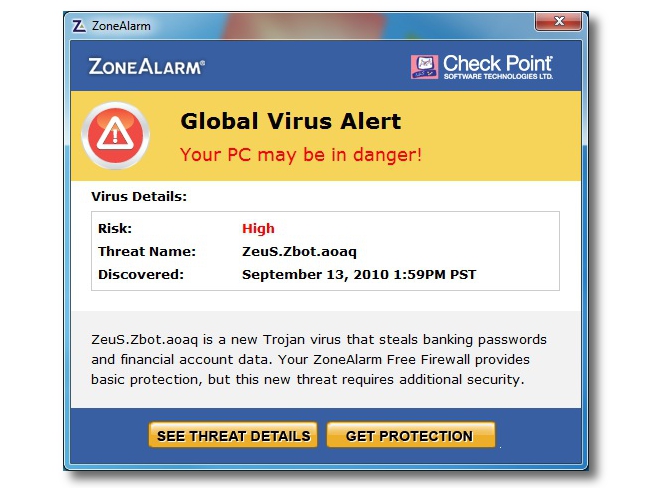ZoneAlarm Using ''Scareware'' to Sell Firewall
ZoneAlarm's developer is using scareware tactics to force free-version clients into purchasing the full suite.
Here at Tom’s Guide our expert editors are committed to bringing you the best news, reviews and guides to help you stay informed and ahead of the curve!
You are now subscribed
Your newsletter sign-up was successful
Want to add more newsletters?

Daily (Mon-Sun)
Tom's Guide Daily
Sign up to get the latest updates on all of your favorite content! From cutting-edge tech news and the hottest streaming buzz to unbeatable deals on the best products and in-depth reviews, we’ve got you covered.

Weekly on Thursday
Tom's AI Guide
Be AI savvy with your weekly newsletter summing up all the biggest AI news you need to know. Plus, analysis from our AI editor and tips on how to use the latest AI tools!

Weekly on Friday
Tom's iGuide
Unlock the vast world of Apple news straight to your inbox. With coverage on everything from exciting product launches to essential software updates, this is your go-to source for the latest updates on all the best Apple content.

Weekly on Monday
Tom's Streaming Guide
Our weekly newsletter is expertly crafted to immerse you in the world of streaming. Stay updated on the latest releases and our top recommendations across your favorite streaming platforms.
Join the club
Get full access to premium articles, exclusive features and a growing list of member rewards.

Firewall developer Check Point Software Technologies has come under fire from consumers using the free version of its popular ZoneAlarm firewall client. According to complaints, the company is using scareware tactics designed to frighten users into purchasing the paid version by flashing fake pop-up warnings.
"So I get this pop-up when I started my computer. I'm used to malware trying this ... junk," said one consumer on the ZoneAlarm forums. "Now I understand that Check Point wants to advertise its other products, but when did they start using these stupid tactics. You may just finally push me into buying a firewall product--from someone else."
Another user thought the pop-up was real and was convinced that the hard drive needed formatting. "ZoneAlarm has popped up with a virus warning me that it will take my personal financial details, login and passwords. I am extremely worried about this I cannot afford to let my information get stolen," the post read.
The pop-up in question--labeled as Global Virus Alert in bold, black letters--insists that the consumer's PC may be at high risk from the ZeuS.Zbot.aoaq Trojan virus. This nasty malware steals banking passwords and financial data that apparently isn't blocked by the free version of ZoneAlarm. The pop-up provides a link to purchase the full security suite which also contains an anti-virus scanner provided by Kaspersky Labs.
ZoneAlarm's "GeorgeV" said that the pop-up is merely information about a new virus, and that it does not indicate that the user's system is infected. "Letting you know that in addition to your ZA Free Firewall," he said. "You also need a good anti-virus program to protect you against viruses. If you already have a good updated anti-virus program installed, then you can just ignore the notice."
According to the company, the full ZoneAlarm suite is the only solution that blocks this particular Trojan--Norton, Free AVG, Free AVAST Free Avira, and TrendMicro apparently do not. The Register said that Check Point culled the data from VirusTotal without permission from Hispasec Sistemas. It's believed that the information is actually outdated.
Get instant access to breaking news, the hottest reviews, great deals and helpful tips.
Kevin started taking PCs apart in the 90s when Quake was on the way and his PC lacked the required components. Since then, he’s loved all things PC-related and cool gadgets ranging from the New Nintendo 3DS to Android tablets. He is currently a contributor at Digital Trends, writing about everything from computers to how-to content on Windows and Macs to reviews of the latest laptops from HP, Dell, Lenovo, and more.
-
HalJordan ReplyZoneAlarm's "GeorgeV" said that the pop-up is merely information about a new virus, and that it does not indicate that the user's system is infected.
Bull. They know exactly how the layman will react to such a pop-up. Just because there are computer illiterates out there does not give companies, companies that claim to be protecting them, the right to shuck 'em. -
JohnnyLucky I would think the last thing a user wants is a pop-up advertising, especially one that is capable being misunderstood.Reply -
I migrated to Comodo once I moved to Vista 64 (now Windows 7 x64) since ZA didn't support 64-bit systems. Still use it and recommend it as an excellent free FW+AV package.Reply
-
Hilarion Yeah, I ignored it and I'm looking for another firewall tool that doesn't use "malware" style advertising.Reply -
thejerk ZA was never a good free firewall. Almost ten years ago, it was suspected to be at least malware and certainly bloat-ware. The built-in Windows firewalls are very good, and shouldn't be replaced by normal users with other software firewalls, anyway.Reply -
Vampyrbyte This kind of shit should be illegal under international law and punishable with prinson sentences in complying countries, and treated as an act of aggression to the countries of the UN for any country to house someone doing this absoloute scamming shit!Reply
 Club Benefits
Club Benefits










